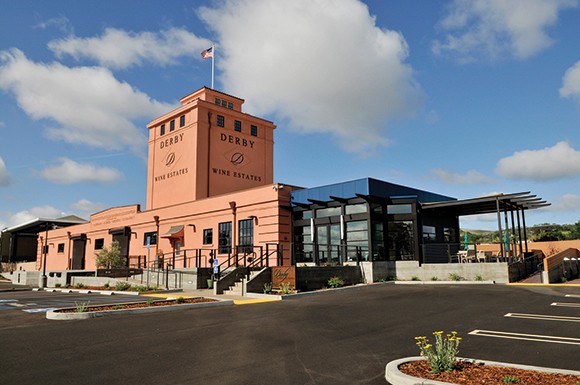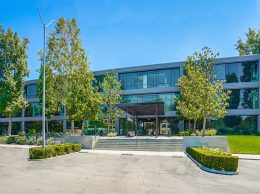Family-owned winery restores Paso Robles landmark
IN THIS ARTICLE
- Latest news Topic
- Elijah Brumback Author
By Elijah Brumback Friday, January 16th, 2015

The restoration of this historic agricultural building is earning a beautification award from the Paso Robles Chamber of Commerce for Derby Wine Estates, the building’s new owner. (Photo courtesy of Derby Wine)
The building at 525 Riverside Ave. in Paso Robles, once referred to as “the symbol of success in the almond industry,” was on the verge of being torn down before Derby Wine Estates stepped in to save the iconic pink structures.
As winemakers well know, some things are better with age and that’s at least part of the reason Ray and Pam Derby, the winery’s owners, purchased the building in 2010 and spent three years restoring it. For their efforts, the winery is receiving the 2014 Beautification Award from the Paso Robles Chamber of Commerce on Jan. 24.
The new winery and tasting room, which is located in the building’s central tower, officially opened on April 11 of last year. About 11,000 square feet is now used for processing space, with a 750 square-foot tasting room and 1,000-square foot VIP lounge that overlook the city.
When the Derby family bought the building it had fallen in to serious disrepair, which is why the previous owners Smart & Final, a chain of deep discount supermarkets, was planning to tear it down to make way for a new location. Those plans were thwarted when the city stepped in and conducted survey that would ultimately lead to the property being classified as a significant historical resource under the California Environmental Quality Act. At the time the building was defined as having immense cultural importance as relic that held much of Paso Robles’ agricultural heritage.
The cost of the restoration is a tightly held secret by the owners and staff, but because of the extensive degradation of the structure, environmental issues and some unforeseen issues — including unearthing of a storage tank full of oil — those close to the project said the price tag was “a pretty penny.”
“It was an expensive project, that’s the bottom line,” said Sandy Throop, Derby’s director of finance and administration. “There were no plans for the original building and the contractors basically had to tear everything back to the bones of the structure.”
The building was originally constructed in 1922 and was owned by the Almond Growers Association until 1936, when it was sold to the Farmers Alliance. For nearly 84 years, the facility was used as a grain brokerage, until the operation finally closed in 1975. Ten years later the building reopened as a cooperative of local businesses known as the Riverside Centre, finally falling into Smart & Final’s hands. Thanks to the city’s refusal to allow demolition, the Derby family took a chance, promising to breathe new life into the building while retaining its history.
“The greatest challenge was balancing the desire to retain as much of the original structure as possible while at the same time, complying with 21st century regulations,” Ray Derby said in a statement.
The execution of that idea was left to San Luis Obispo-based architect Craig Smith and builders Mike and Neal Construction.
“The design approach was to establish the business in an improved and safe structure, but still maintain the historical aspect and resemblance of the existing building,” Smith said. “A key feature was the old almond storage tower.”
With a littler structural updating and the inclusion of a new elevator, the tower was turned into the Almond Room, where Derby holds private tastings.
The moved to the new facility has been a big upgrade for Derby from its original digs in a rehabbed mobile home off of the 46 East freeway, also the site of one its four vineyards.
“For one, [the building] is a beautiful venue for us to showcase our wines … it’s also the tallest building in Paso Robles and has amazing views from the tasting rooms,” Throop said. “Also, in the past we would have to crush at other off-site locations and now we can do all of it on site. We also have barrel storage that we didn’t have before and all of our offices are together.”
With the new facility, Derby also has the capacity to produce up to 20,000 cases annually, however there are no plans to scale up production to the max anytime soon.
“Our anticipated crush will continue to grow and increase in the future. We’ve really stepped up our game in new facility,” Throop said. “We definitely have capacity to increase our growth, but we still want to produce really high quality wine. We have a lot of room to grow, but we want to be smart about it.”
Even though Derby owns and oversees about 400 acres of vineyards — three in the Paso Robles ABA and one in San Simeon near Hearst Castle — the winery only crushes about 5 percent of its harvest and sells the rest to other wineries. Throop said the winery itself produces about 3500 cases annually, which is likely to increase marginally over the next several years.
In the 90s the Derbys moved to Central Coast to retire. In 1998 they purchased their first vineyard property, the Derbyshire Vineyard. In the next several years the Derby’s acquired Laura’s Vineyard in East Paso and then the Westside, now called the Derby Vineyard. The winery eventually took off in 2008 as Derby Wine Estates.










